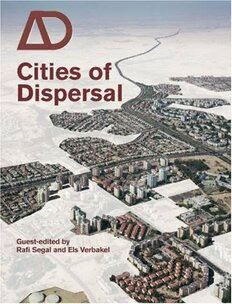
Cities of Dispersal (Architectural Design January February 2008, Vol. 78, No. 1) PDF
139 Pages·2008·18.72 MB·English
Most books are stored in the elastic cloud where traffic is expensive. For this reason, we have a limit on daily download.
Preview Cities of Dispersal (Architectural Design January February 2008, Vol. 78, No. 1)
Description:
Questioning the traditional boundaries between cities, suburbs, countryside and wilderness, this issue of AD explores emergent types of public space in low-density environments. It describes this new form of urbanism: decentralised, in a constant process of expansion and contraction, not homogenous or necessarily low-rise, nor guided by one mode of development, typology or pattern. While functionally and programmatically dispersed, settlements operate as a form of urbanism the place of collective spaces within them has yet to be defined and articulated. The physical transformation of the built environment on the one hand, and the change in our notion of the public on the other - due to globalisation, privatisation and segregation - call for renewed interpretations of the nature and character of public space. The concept of public space needs to be examined: replaced, re-created or adapted to fit these conditions. What is the place of the public in this form of urbanism, and how can architecture address the notion of common, collective spaces? What is the current sociopolitical role o such spaces? How does the form and use of these spaces reflect the conception of the public as a political (or non-political) body? And can architecture regain an active role in formulating the notion of the collective? These and other issues are addressed through essays, research projects and built work by distinguished writers such as Bruce Robbins, Albert Pope and Alex Wall, and Practitioners including Zvi Hecker, Vito Acconci, MUTOPIA, Manuel de Sola-Morales, Martha Rosler and Manuel Vicente in a search for new collective architectures within the dispersed city.
See more
The list of books you might like
Most books are stored in the elastic cloud where traffic is expensive. For this reason, we have a limit on daily download.
